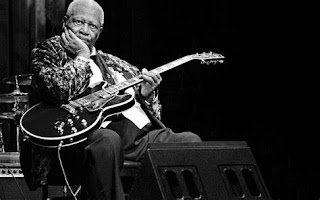Blues
- a tonic for whatever ails you.
B.B. King is quoted as saying, "Blues is a tonic for
whatever ails you." I am reminded of a skit on the Flip Wilson show. In this skit, Flip Wilson played a club owner looking for an entertainer to sing and play the
Blues. One of the applicants was white, and he said, "Everybody knows the
Negro gave the Blues to America." His wife (in the "Geraldine"
voice) said, "Jus' a minute, honey! The Negro didn't give the Blues to
America. America gave the Blues to the Negro." And so it is; it has not
been a bed of roses for blacks here in America.
Early on many Sunday mornings, as
my Mother and her sons prepared to go to church, I would dress while listening
to B.B. King and other Blues songs. I remember my mom asking, in frustration
once," Son, it's Sunday morning; must you play the blues." My
response makes me feel good. Why?
Racial trauma historically has been ignored, submerged
under denial, fear of rejection, and caprice on the part of various racist
structures, practices, and policies. Racial trauma can result from multiple
communities in which we exist, have existed, or have avoided. It can result
from dealing with various institutional actors such as police hiring,
supervisory personnel, and colleagues. It can result from policies and laws
back into the system/structures. It results from covert and overt
actions.
Let me begin by stating I grew up in an apartheid city -where whites lived on one side, blacks on the other. I attended exclusively black schools until college, when I formally entered into the white university and white spaces. I am a Viet Nam veteran, and PTSD for both being black and a combat veteran are separate but related entities. Yet, through it all, blues has been my friend. And now let us walk down that road paved with song, sorrow, and uplift.
One of the classic blues songs, written by Abel Meeropol and sung by Billie Holiday in 1939, is "Strange Fruit." With this blues song, the protest song was launched unto the American scene as it protested the continual lynching of Black Americans. This declaration of protest was the beginning of the civil rights movement (Margolick, 2000) and brilliantly articulated the racial trauma of the period.
Southern trees bear a strange fruit,
Blood on the leaves and blood at the root,
Black body swinging in the Southern breeze,
Strange fruit hanging from the poplar trees.
Pastoral scene of the gallant South,
The bulging eyes and the twisted mouth,
Scent of magnolia sweet and fresh,
And the sudden smell of burning flesh!
Here is a fruit for the crows to pluck,
For the rain to gather, for the wind to suck,
For the sun to rot, for a tree to drop,
Here is a strange and bitter crop.
No one can forget, or should be ignorant, of the 1964 song, Mississippi Goddam. This song articulated the racial trauma associated with the murders of Emmitt Till and Medger Evers and the bombing of the 16th Street Baptist Church in Birmingham, Alabama. Between 1882 and 1968, an estimated 4.7 thousand Americans were lynched; of these, 3.5 thousand were blacks. And Mississippi was at the top of the list.
-
Lynchings in America were public events; hell, they were
parties as whites would come from all over the country to participate and
celebrate this strangely local custom. Killing blacks, burning black towns, and
rape of black women were all part of the racialized trauma. And the strange fruit
that this produced was rarely punished by any court. Strange fruit indeed.




Comments
Post a Comment